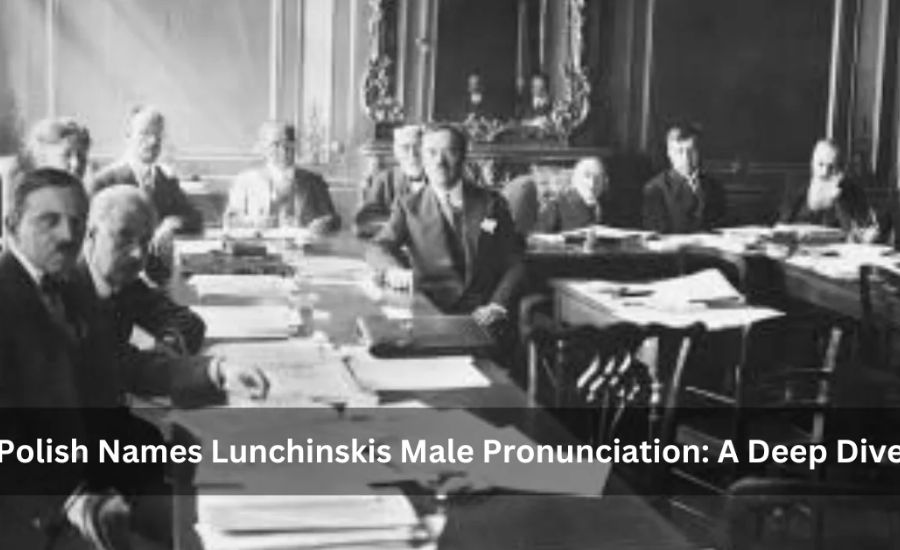Is Lunchinski a Polish Name Pronunciation, Surnames & More
Introduction to Is Lunchinski a Polish Name Pronunciation
Polish names are rich in history and carry a unique cultural and linguistic essence, with each name reflecting a piece of Poland’s heritage. One such name that encapsulates this depth is “Lunchinskis,” a Polish male name that offers insight into the traditions and linguistic structure of Polish nomenclature. In this article, we will delve into the origins, meaning, and correct English pronunciation of “Lunchinskis,” highlighting the importance of proper articulation to honor its roots. Polish names often include complex combinations of sounds and letters that are less common in English, making pronunciation a key part of cultural respect and understanding. We’ll also explore the historical background and cultural relevance of Polish names like Lunchinskis, helping to shed light on their importance in Polish identity. Additionally, we’ll address common questions and provide examples to give readers a comprehensive guide to appreciating and pronouncing Polish names authentically. Through this exploration, you’ll gain a deeper understanding of the linguistic beauty and cultural significance that Polish names like Lunchinskis represent, helping to preserve their heritage in an increasingly globalized world.
The Importance of Polish Names and Surnames

Polish names hold deep-rooted significance within Polish culture, echoing a legacy that spans centuries. Polish surnames, like those in many Slavic cultures, often offer insights into a person’s ancestral history, familial ties, geographical roots, or the profession of their forebears. These names serve as bridges to Poland’s history, as they can reveal an individual’s place within broader historical narratives and social frameworks.
The meanings embedded in Polish surnames are often reflective of key aspects like geography, family lineage, and occupations, marking the importance of one’s heritage. Surnames derived from places of origin frequently signal a family’s historical ties to a particular town, village, or region, thus preserving a sense of regional identity. In a country with a long history of shifting borders and regional diversity, a surname can act as a historical artifact, revealing clues about where ancestors once lived or held land.
Occupational surnames, on the other hand, capture the essence of a family’s historical trade, possibly pointing to a past life spent as bakers, smiths, or other skilled workers within traditional Polish society. Additionally, patronymic surnames denote descent, essentially acting as a verbal family tree by indicating a relationship to an ancestral patriarch. Within this cultural framework, the surname “Łuńciński” (as represented by “Polish Names Lunchinskis Male Pronunciation”) takes on a notable place, symbolizing a connection to a rich Polish heritage.
Origins and Meaning of Polish Names “Łuńciński” (Lunchinskis)
The surname “Łuńciński” has origins steeped in Polish history, likely tracing back to the family’s connection to a specific region or geographic location. In Polish naming conventions, the suffix “-ski” (or “-ska” for females) is particularly significant, often indicating nobility, land ownership, or an elevated social status. Historically, Polish surnames with the “-ski” suffix were associated with the nobility, known as the “szlachta.” This social class was integral to the country’s governance and military, especially during the feudal era.
The root part of the surname, “Łuń,” suggests potential ties to nature. Some linguists posit that “Łuń” could derive from old Slavic words connected to natural elements such as the moon (“łuna”) or light (“światło”). This connection hints at an ancestral reverence for nature, aligning with the Polish cultural theme of integrating nature into names and symbols. In a broader cultural sense, the combination of the natural element “Łuń” and the noble suffix “-ski” conveys an image of a noble lineage, perhaps once rooted in land associated with natural beauty, tranquility, or spiritual significance.
Thus, the surname “Łuńciński” (or its alternative, “Polish Names Lunchinskis Male Pronunciation”) may symbolize a noble or esteemed family background, entwined with Poland’s natural landscape and historical landmarks. This name, as with many Polish surnames, resonates with heritage, geography, and cultural pride.
Polish Names “Łuńciński”: Pronunciation Guide

The pronunciation of Polish names, mainly people with specific letters and sounds, can pose challenges for non-local speakers. The call “Łuńciński,” for example, includes several Polish phonetic elements unfamiliar to English speakers. Understanding these sounds lets in for a deferential and accurate pronunciation, honoring the call’s original which means.
Breaking down the pronunciation of “Łuńciński” involves examining each segment:
- Ł: The letter “Ł” in Polish is pronounced like the English “W.” Therefore, “Łuń” would sound similar to “Woon.”
- ń: The “ń” sound in Polish is akin to the “ny” in the English word “canyon.” This nasalized sound doesn’t have an exact English equivalent, requiring a softer, palatal quality.
- ciń: In this part, “ci” is pronounced with a “ch” sound, as in “cheek.” The “ń” once again takes on a nasal “ny” quality, combining to sound like “cheen.”
- ski: The “ski” suffix is common in Polish surnames and is pronounced as “skee.”
Altogether, this yields an approximate pronunciation of “Woon-cheen-skee.” Mastering these nuances is a sign of cultural respect and an understanding of the subtle details within Polish names.
Common Mistakes in Pronunciation of Polish Names
Many non-native speakers encounter obstacles when pronouncing Polish names due to unfamiliar letters and sounds. The intricacies of Polish phonetics, especially in names like “Łuńciński,” often lead to specific errors. Recognizing these common mistakes can help avoid mispronunciations and better convey respect for the cultural context.
- Mistaking “Ł” for “L”: In Polish, the letter “Ł” is distinct from “L.” Pronouncing it like an English “L” instead of “W” alters the sound of the name, potentially distorting its meaning and heritage. This error is common among English speakers who may overlook the slight diagonal line in “Ł.”
- Overemphasizing the “ń” Sound: The nasal “ń” sound in Polish is subtle, requiring a light, palatal touch. It’s easy to mistakenly pronounce it as a hard “n” sound, which would disrupt the smooth flow of the name. The sound is more akin to the gentle “ny” in “canyon,” providing a soft transition rather than a hard stop.
- Mispronouncing the “ski” Suffix: The “-ski” ending is fairly straightforward but can still be a source of confusion. Some English speakers might pronounce it as “sky” instead of “skee,” which changes the sound and dilutes the cultural authenticity. Knowing these frequent errors and practicing the correct pronunciation can greatly enhance one’s understanding of Polish names.
Historical Significance of the Surname “Łuńciński”
The surname “Łuńciński” (alternatively, “Polish Names Lunchinskis”) carries with it a historical legacy. In medieval Poland, surnames such as “Łuńciński” likely belonged to families of notable standing, often affiliated with the szlachta, the Polish noble class. This aristocratic group played an influential role in the country’s politics and military, especially during Poland’s feudal era when land ownership signified power.
Surnames ending in “-ski” were commonly reserved for families of noble origin, distinguishing them from peasants and townsfolk. This suffix served as a linguistic marker of higher social status, denoting a connection to land, authority, or military duty. The family name “Łuńciński” may have even referenced a region or estate under the family’s domain, linking it to specific lands or historical territories within Poland.
While the Polish nobility no longer holds the same political influence in modern times, surnames like “Łuńciński” continue to resonate with history, symbolizing the enduring presence of cultural and familial heritage across generations.
Cultural Relevance of Pronouncing Polish Names Correctly

Pronouncing someone’s call accurately, specially names from different cultures, displays respect for that person’s identity, records, and historical past. In Polish subculture, names hold a deeply personal and social significance. They are not simply identifiers however also are reflections of lineage, family heritage, or even social elegance.
For names like “Łuńciński,” mastering pronunciation demonstrates an appreciation for Polish history and culture. In social and business interactions, taking the time to pronounce a name correctly fosters rapport and establishes mutual respect. Proper pronunciation helps bridge cultural divides and underscores a commitment to cultural sensitivity, especially in international or cross-cultural settings.
Notable Individuals with the Surname “Łuńciński”
Although not as widely recognized as some other Polish surnames, “Łuńciński” may have historical ties to prominent figures in Poland’s history. Families bearing the “-ski” suffix were often landowners, military leaders, or influential figures within their regions, which suggests that the surname “Łuńciński” could appear in historical records associated with regional governance or land stewardship.
While direct records of “Łuńciński” are less common in popular history, the name itself bears noble connotations. Polish archives may contain references to families with the surname who contributed to local governance or participated in the military efforts that protected Poland’s sovereignty. Thus, the name “Łuńciński” may carry a subtle association with prestige and influence in Polish history.
Evolution of Polish Names Over Time
Polish names have evolved significantly over centuries due to social, political, and migratory influences. For instance, during periods of occupation or forced migration, Polish surnames like “Łuńciński” underwent adaptations to suit new linguistic or cultural environments. The pressures of Latinization and Anglicization led many Polish families to alter the spelling or pronunciation of their surnames, either for easier assimilation or as a requirement under foreign governance.
- Polonization and Latinization: During earlier periods, particularly under the influence of the Catholic Church, Polish names were sometimes Latinized in records. This practice introduced new spelling conventions, often making names appear more formal or religiously aligned in official documents.
- Anglicization: For Polish immigrants in English-speaking countries, names like “Łuńciński” were frequently simplified. This was done to facilitate pronunciation, avoid discrimination, or integrate more smoothly into English-speaking societies.
Polish Naming Conventions and Gender
Polish names follow distinct gender conventions, an aspect that adds further complexity to pronunciation and understanding. In Polish, most surnames have male and female variants. For example, the masculine form “Łuńciński” changes to “Łuńcińska” when referring to a female. This gender-specific system extends to most Polish surnames, reflecting the language’s grammatical structure.
In addition to suffix changes, gendered endings reinforce familial identity while respecting the linguistic patterns of Polish. Although these differences might seem minor, they are essential in Polish culture, reflecting a profound appreciation for grammatical accuracy and social respect.
Conclusion
In conclusion, Polish names like “Łuńciński” offer a window into Poland’s rich cultural heritage, rooted in geographic, occupational, and noble associations. Understanding the pronunciation, historical significance, and evolution of these names fosters respect for Polish identity and tradition. For those engaging with Polish names, whether personally or professionally, making an effort to pronounce and appreciate their full context can deepen connections and show cultural sensitivity. Each Polish surname, with its unique structure and meaning, encapsulates a piece of history, making it a valuable link to the country’s past and a source of pride for generations.
For more Information About Biography visit francherway






